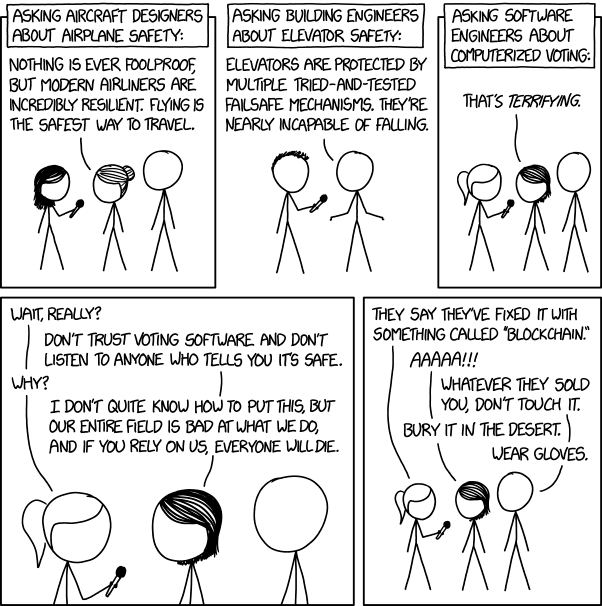Japan has been in the year 2000 for the past 50 years.
Cash is king, we shouldn’t be paying MasterCard and VISA for every purchase we make.
Case in point: when the UK left the EU, MC and VISA immediately increased their transaction fees from 0.3% to 1.5%.
Cash isn’t much use for making purchases online, which is also where an ever increasing amount of spending is done.
There’s no coin or note slot on my laptop, and contrary to the internet’s advice throwing money at my screen doesn’t seem to work either.
I used to be a big proponent of cash but with the bulk of my financial activity happening online now I can’t help it feeling a bit redundant.
Cash is needed nonetheless because when there is a downtime for whatever reason, it is not good if the only thing you have is a card.
Mullvad lets you mail them cash, but I don’t think it’s scalable nor fast enough to be widely used.
Retaining some ability to spend and use cash is vital because otherwise, all our financial transactions are totally controlled by the banks, and they are completely untrustworthy. The cost is inconvenience.
Yes that’s fair enough, cash doesn’t work online - but bitcoin is a better solution for online transactions than cards.
I mean, we haven’t even got into the subject of data tracking. If you think Facebook is bad, consider for a moment how much your card provider knows about you. Banks and card companies have learned from Facebook, and data brokerage is now a trillion dollar industry - with only 8 billion people in the world (many of whom don’t use the internet or have data being traded), that means your data is worth roughly $1,000 a year. Surely, as the manufacturer of the data, you should be getting some of that?!
Lol Bitcoin is not better than cards for online shopping, the only thing it’s better for is buying whatever you’re smoking.
Objectively, bitcoin is better for online transactions. It’s not even all that safe for buying drugs - every transaction is recorded permanently in an open ledger, so it’s actually much easier to trace (at least up to the end points where traditional currency is exchanged).
It might be less widely accepted, but that’s only because of how insidiously endemic MasterCard and VISA are.
How is bitcoin objectively better? That’s a pretty bold statement that needs some backing arguments.
They both have pros and cons, but until BTC have garanteed near instanteneous transaction confirmation, I don’t see how that would work at the grocery store for example.
Bitcoin is objectively better based on the way it works. Subjectively, with the established infrastructure behind it, traditional card payments are artificially better - purely because of convenience. But on a level playing field bitcoin works better and is less susceptible to negative influences.
The grocery store is not typically an online transaction. I did specify online transactions. For buying groceries online, bitcoin would be better - there are no fees when trading bitcoin. When trading cash, there are no fees.
When putting cash into a business account, there are fees, and as almost all businesses put their money into an account they pay these fees. These cash deposit fees and card processing fees have grown in such a way as to entrap nearly all commercial transactions.
Objectively, it’s better if there aren’t fees, particularly when the fees are not proportional to the actual service the fees are supposed to represent.
That’s a weird take. A system is better because it’s free?
I re-read your comment and I missed the fact that you said online buying, sorry about that.
One advantage of traditional CC over Bitcoin is buyer insurance against fraud. If someone gets a hold of your Bitcoin wallet, he can take out everything and you have no recourse.
If someone steal your credit card and make fraudulent purchases, the transactions will be cancelled and you won’t be left on the hook.
bitcoin is a better solution for online transactions than cards.
Aaaaaand now you’ve lost me.
Aaaaand how?
For one, Bitcoin is inefficient and energy intensive technology.
Just saw a sign in my bakery today begging people to pay by card because getting small coins from the bank is hard and expensive.
TBF here in Belgium Bancontact has a local monopoly (about 1 % flat fee, no fixed cost per transaction; that seems fair and intuitively cheaper than holding, insuring, depositing cash, dealing with employees skimming off the top, of the time lost counting bills).
Also the government heavily incentivizes electronic payments because those can’t be pocketed without paying VAT. That’s a MONUMENTAL amount of tax fraud being chipped at by the progressive disappearance of cash.
Seems like an easy fix for a business, just change their prices so that they don’t have to use coins. Make everything an integer number of dollars. If the items are too cheap to round up, encourage a three for two deal or something like that.
Sales tax doesn’t change that frequently. It’s easy for a business to predict and account for it when setting their prices.
… the euros’ lowest paper bill is 5€. 1 € and 2€ coins are bulky pieces of shit too.
And a bakery is the worst affected kind of business even if there was a 1€ paper bill. A loaf of good bread is 1.40€, if you round up it’s way too expensive and if you round down they may not even make a profit. Can’t exactly buy 3 loaves of bread either unless you got a family of 6 to feed.
Unfortunatley that won’t work, banks charge businesses a percentage for deposits.
That’s the real crux, banks charge businesses to deposit cash. They do it in such a way that there’s no way to escape their ever-increasing fee percentage.
The mattress solution is more and more appealing, imo.
Also the government heavily incentivizes electronic payments because those can’t be pocketed without paying VAT. That’s a MONUMENTAL amount of tax fraud being chipped at by the progressive disappearance of cash.
Unfortunately I think the amount of cash tax fraud that exists is far more reasonable than the amount of straight up fraudulent, yet “legitimate”, expenditure that governments allow. See, for example, covid PPP loans.
Write offs, PPP loans, deferrals, and all the other accounting tricks that the government carved out for the primary benefit of the wealthy are definitely a bigger loss of tax revenue. One guy writing off a personal vehicle for his personal business is probably what a busy restaurant makes in 4 months of cash purchases. Suppliers and distributors are also unlikely to deal with large volumes of cash just as a matter of practicality and risk, and the fact that you can’t have a functioning business with employees that need paychecks without going through banks which go through the government, unless you’re operating with an entirely under the table staff which is just begging for trouble.
The people insisting on using cash are the ones with a big pile of it, with origin dubious to unknown. Anti tax evasion is the best part of digital banking. Threats to privacy is the other side of that coin unfortunately…
Honestly there should be governmental electronic cash with the same advantages as cash, i.e. no fees & no traceability.
there are very easy free bank accounts to open.
Traceability is the tricky part.
The cost of a bank account has nothing to do with fees for electronic cash. Fees for electronic cash are collected per each transaction and are paid by the business you buy from. These huge fees are why businesses are slow to adopt electronic cash in Germany, they see no reason to pay 1%+ of their revenue to Mastercard or Visa or whatever.
You… are not an adult, are you?
Mastercard and VISA are not banks and don’t offer bank accounts.
Bank accounts are free. Transfers to and between banks are free.
That 1% fee you’re talking about is a processing fee from the credit card companies, which are separate financial institutions acting as middlemen to the banks.
There is no need to use their services. You can just transfer bank to bank for free, with free bank accounts. No MasterCard or VISA involved at all.
You… do not know what thread I was replying to, do you?
What is being talked about is high fees associated with each transaction done with electronic cash. Please read the comment I directly responded to again: https://lemm.ee/comment/6705330
It is necessary to use their services (or at least some other entity collecting fees) when you pay without cash in a store. You can’t go to a store and pay with direct bank transfer.
Also, PS: this comment I wrote a while back: https://lemmy.world/comment/5658808
Removed by mod
I dunno, there are good arguments for traceability. Bitcoin has complete traceability, up to its endpoints.
Re: credit card companies: you’re right, and you’re not the first to say it.
South East Asia is pissed off at them and their fees too. Starting in Thailand (but spreading) their big banks got together and made a QR code system for instant sending of money (similar to what Australia did with PayID which obfuscated bank account numbers with your own phone or email address, and stacked with Osko, a fast transfer system to bypass the slow (days) bank to bank transfers).
You will see street vendors with food carts with a QR code on it. You want to buy something? You order, they say the price, you scan the code, send the money, show your phone, get your food.
(You can have codes with the payment amount already in it, like in a bill, but since this is just a food cart on a sidewalk, they just have one generic “pay me” code)
Because they are bank to bank, it’s all fee-free.
And yes, in the USA you have Venmo and similar, which has other issues, I think.
In the Philippines so many people use pay-as-you-go and prepaid phone plans, and load up their account with credit, they’ve gone further. People could gift credit to other people for a long time. Now, you can actually pay for things with your phone credit there. (GCash, which confused me for a Google product for a while). There’s only two mobile/cellular phone companies in the country (all the rest are resellers), so it has some monopoly issues. But what it means is since everyone has a phone (doesn’t have to be a smart phone. A nokia style dumb phone is fine), you don’t need cash or to pay VISA/MC.
Cash is garbage. Using cash electronically is good.
Using credit card companies is dubious.
Electronic is faster, more convenient, safer, easier to track, and doesn’t need a stupid purse to carry around.
Haven’t touched cash since 2020, couldn’t be happier.
If only there was some way of federating spending in a way that would make private credit card companies obsolete. I’m still confused how no one sees any future in block chain and just say “it’s all a scam”.
Block chain has become a buzz word, just like AI or NFT’s, but they sure as hell makes some people a chunk of money before everyone realises what it actually means.
because it doesn’t work. case in point: it hasn’t. It improves on one aspect, and regresses (very very badly) in every single other aspect.
Very large amount of people end up paying fees from ATMs to get cash. And, if there weren’t card service, you bet the banks would add fees to any type of cash access, eg: all ATMs and bank withdrawals.
Other countries don’t have ATM fees, either. I can go to almost any cash point with any bank and withdraw for free. It’s only certain ones that charge, typically places with a captive audience eg festivals or certain retail parks.
The US is incredibly strange for charging people money to get their cash.
ATM fees do make sense if it’s not a bank owned ATM, though. A separate company owns and maintains the machines, which costs money.
Yeah, those are the only ones that might charge. Standalone ones in shops, not at a bank branch, and in particular in places where people might be out drinking.
I’ll just tell you about Japan… they will have “outside of business hours” ATM fees just because. Link to website
With the Postal Bank it is possible to carry around your passbook in place of your debit bank card to access your account. Even from an ATM that automatically records transactions in there which is kind of retro yet cool.
Edit: added link
So some ATMs don’t have fees, and some locations do have fees.
Wow, sounds exactly like how it is in the US, too!
My experience in the US is you pay fees whenever you withdraw from a bank that isn’t your own. In other countries, you don’t pay fees unless you withdraw from an independent machine, and even then many are free.
I dunno though, I had a cushy US bank with no branches of their own, so they didn’t charge fees anywhere. BoA were bastards though, and I’ve heard terrible things about Chase.
Chase has some of the best bank accounts in America.
The bank may be awful, but some of their products are among the best in the world.
Heh, they’re in the UK now too? Cool. Yeah, the UK has some pretty shitty bank accounts from what little I’ve seen, so this helps.
Chase are still pricks though, to be clear. Bunch of bell-ends.
I don’t pay them. The business conducting the transaction does :p
You mean, the fee is already baked into the sticker price, so you’re paying it regardless of which payment method you use.
Ya
No thanks
When I found out about all that I was honestly kinda glad my country, Germany, isn’t the only one that’s in the past in terms of bureaucracy and digitalization of services.
But cash is a weird point to add. A society without cash would kinda be dystopian ngl
Without cash, you can’t have privacy. All card or contactless payments are logged and probably sold to advertisers or anyone with enough cash who wants that info.
Very true. But those advertisers and data brokers (and governments) have convinced most people that the convenience is worth it, and that only criminals desire that level of privacy.
They can’t stop me from using cash if I want to though. It is legal tender for all debts, public and private.
Debts, yes. But businesses don’t have to accept cash if you pay before the service is rendered or the product is purchased.
Businesses in the USA, especially regions with a higher proportion of black or hispanic residents, will go out of business if they stop accepting cash. It’s not going to happen.
It is legal tender, but you can’t force people to accept cash in their own businesses. Before you walk into a store, they can say we do not accept cash. By walking in and buying, you agree to not use cash
Yeah but that doesn’t happen. Cash payment is the default standard that backs up the other forms of payment that depend on Internet / phone infrastructure and electricity.
No business that I have ever patronized has refused cash, but many have been cash only and were not able to accept cards or contactless payment. Power outages, Internet outages, etc all can bring down payment systems’ infrastructure.
That’s how it is in the USA, and it’s a good system. Cash is reliable and puts the entire monetary purchasing power into the literal hand of the citizens, versus cards and other digital payment systems that can be controlled by authorities to deny your access to your own money.
It does around here (Norway). I’ve never even seen how our cash looks like since the late 00s.
The US is a shit system made for fucking the average tax player in the ass
Sounds like you don’t know what you’re talking about. This all works fine in the USA for us, it’s not a bad system at all.
I have ALL options available to me - cards, contactless payment, cash, credit, whatever. I celebrate the fact that cash is an option that lets me avoid having every data-hoarding entity collect records of my purchases.
Taxes aren’t fucking me anywhere, I pay them and I get government services and infrastructure in return. Taxes aren’t hurting me at all in fact.
Why the fuck “cash society” is backside? It means they care about privacy.
Not taking cash = backwards.
Not taking digital payments = also backwards.
suggesting crypto?
They’re just suggesting that you should accept both cash and electronic payments.
that sounds weird though. is he suggesting that one should be fed to a tree? eff that.
I’m not responding to that comment?
Get fed right to the joshua trees.
what
Yes
ugh you suggest i should be fed to a tree?
Yes theyre hungry
Suuuure, “privacy”. Wink wink.
I’m a criminal! Wank wank, nudge nudge
Question: do the Japanese actually care about privacy? I know I do, but if you were to ask a Japanese person why does their country use cash, would they say “We have considered a system of payment cards and decided against it for privacy reasons” or would they just shrug and say “I dunno, I’m not in charge of payment systems, I use what I have”?
The post isn’t about privacy, if it was, faxing wouldn’t be on there. I’d wager a strong guess it’s about convenience on one hand while choosing to be inconvenient on the other.
Edit: or maybe it’s more about high tech in some sectors and low tech in others, still not about privacy.
Why privacy would mean no fax? Fax is mostly more secure than email.
Fax is unencrypted. Encrypted versions apparently exist but that’s not what Japan and Germany use.
And that aside my mom regularly gets sensitive patient data via fax at her workplace because the number is one digit off some doctor’s (bonus points for the inverse also happening, and her also working with sensitive data). Far less likely to happen with email. At most encrypted fax is equally secure.
Not necessarily. It might be privacy but it could also be a combination of other reasons too - a cultural aversion to paperless transactions, a lack regulation for electronic payments, lack of a decent indigenous payment system, lack of financial safeguards, prevalence of fraud / skimming devices etc.
Some European countries were more into electronic transactions than others but with stuff like SEPA, chip & PIN, contactless payments I think most people are just fine using electronic payment unless they have reason to control the transaction in some way. For example I usually pay pretty much everything electronically but I still pay taxis and most restaurants with cash. Also tradesmen if they’ll give me a discount for cash.
I used to work in a shop when I was younger, and the older generation always asked for “cash discount”. Why on earth would we do that, my boss said to me. We need the money to be in the shop’s bank account, not laying around somewhere and not being used.
I remember carrying several 100k of our money, late at night, to our banks night safe and drop it in. That sucked. And they charged us for this too
Cash is off the books so there is an incentive for certain kinds of businesses like tradesmen to take cash because it still works out cheaper since they don’t have to declare it to the taxman.
deleted by creator
Cash is traceable in most countries for decades now. Cash doesn’t mean privacy.
Most of those negatives sound fine to me.
Yeah, like what’s wrong with cash?
America doesn’t really have a functional system for this yet either. It’s a lot easier to just tap your phone on a brick and be done with it, but currently the tap method is pretty hit or miss. And bank transfers are atrocious - why do we pay venmo to do something that Korean banks just straight up do for everyone? In Korea you can just give someone your deposit number and with a couple buttons you send money easily/instantly.
You don’t even have to go that far, Canada has interac e-transfers where you can send money by email. Directly accessible through the standard bank app/site. I haven’t handled cash in years
Ew email does not sound like the place for cash transactions.
But yeah, most countries these days have instant bank transfers. The US is ancient when it comes to payments, “cashing your payslip” isn’t a thing in much of the rest of the world.
They likely mean their bank uses email as an identifier. So the bank asks you the registered email you’d like to send money to. Not that you’re emailing cash or something like that.
Similar to zelle, a third party that fills the gap.
In Australia you can send money via phone number or email (called payid) but it’s not sent in an email or SMS, it’s just that your number/email address is used as a unique identifier linked to your bank account. When someone pays you via either of those, the money gets directed into that account instantly.
And yes, being paid directly into your bank account is standard here and I would say really the only option for most jobs. I’m 35 and have never had a job that doesn’t pay you direct to your account.
The email is like an id for your account. You can use your phone number. AFAIK if you link it email or phone number to your bank and someone sends you money to that email or phone number it doesn’t actually text or email you. The money will be directly deposited into your account.
Theoretically the situation with bank to bank money transfers should be improving - the replacement for the ancient, slow ACH system went live a few months ago. Of course it will likely take several centuries for a critical mass of banks to support it, but there has been some progress at least.
Same in Brazil, i can send i think 10k to anyone in my contact using PIX that was created by the goverment and is opensource, i can pay with it too, there is other way too, but PIX is the easier, just need a internet connection
you can send using ramdom nunber, cellphone number, CPF, qr code, email, just need to configure the key that you want in you bank or bank app, and it just work without fees
I don’t know much about Korea. Do they have laws limiting how much you can be tracked and marketed to?
I have a really slim wallet, which is only possible because I never have to use cash. Also cash is dirty. I can wash my phone once a week to keep it clean but I can’t do that with cash (well I can but what’s the point, and I’ll get accused of money laundering /j). It’s inefficient since you have to count your coins and bills and the cashier needs to do the same and then you have to check if you got the right change. You can also misplace cash, especially coins.
Meanwhile I haven’t had to handle cash for like 6 years now except for extremely rare circumstances and it just feels way better.
Annoying to deal with
It’s not even accurate anymore. Cards are accepted in a lot of places.
It was absolutely true 10 years ago, though. It’s inconvenient always needing to think about how much cash you need to bring, and having a pocket full of change because it’s significant denominations.
Also, their banks are only open on weekdays and close super early. Bank lines were (are?) massive because everyone had to go at the same time due to work hours.
…how? The only acceptable one (Even though I personally don’t like it) is cash.
Fax sucks ass and should have been put in the grave LONG ago, Flash drives are superior to Floppy in every way and fuck paper filing, digitized paperwork is far superior.
If people actually upgraded from FAX, I would have completely agreed. What we have today is an abomination which doesn’t work. Not even a week ago I had an issue with some paperwork where tax office required me to fill some form in PDF, then print it, then sign it, scan it and send it to them. I have a phone with a pen, so I did all of that and skipped few steps. Signed the document on screen. No no no no no. They didn’t want that. They want my signature on paper which I never have to send them but my signature signed through screen is not good enough.
FAX is basically all of this with fewer steps and I can easily see why they wouldn’t want to move away from it. It it works, don’t fix it mentality. Luckily this trend is slowly going away, but damn. Not to mention same IRS office required me to generate a certificate which I can use to digitally sign documents. But I couldn’t do this either, since they accept that only on some documents. A mystery.
As far as floppy disks are concerned, this is mainly for industrial machines. They are still a huge user. Those machines are not replaced every 2 years as they are more robust and made to last. So having a machine older than 30 years still working in industry is nothing new and considering upgrade costs literally millions, it’s simply not worth paying that much money to upgrade to USB.
Lots of those floppy drives in industrial and lab applications (as well as the retro computing enthusiast space) are being replaced by things like GoTek devices, which are essentially floppy emulators with flash memory.
In some places, yes. But many are still not doing the upgrade as it would require technical person to do so, provide tech support, etc. All of that costs money. Whole industry is becoming very specialized place. Siemens still sells laptops with DB9 and other serial connectors just so you can access and program PLCs. And new USB based adapters to serial simply don’t work. Sometimes they do, but most of the time they have issues with these specialized devices.
Floppy drives are the brontosaurus among these, excusive paper filing sucks too, but cash society and fax telecom is not that bad.
I mean these things can’t be that bad, Japan compete well on the world stage so whatever they’re doing is working fine. Can it be improved, probably. Does it need to be? Not yet
-
We use fax in the USA more than you’d think. I’d call that a wash.
-
Paper in your filing cabinet will never be messed with by a ransomware attack. Ransomware attacks seem to happen to businesses and hospitals just about daily here. I’m actually watching a news story on a hospital ransomware attack as I write this.
Floppy drives? Yeesh that one is a bit weird.
-
Yeah honestly living there for a while, I came around a bit on doing things by paper.
It’s slower, certainly. But the Japanese are scary efficient at it, and there is a lot of infrastructure to support it.
And in the case where things go wrong or are confusing, at least you can take the forms and actually go and talk to someone, rather than staring at a computer screen that offers nothing.
Cash society is a bad thing since when
Psyop to make people think that electronic is superior.
Since forever.
Germany is the same but without the bullet trains and the robots wiping your ass.
we have plenty of bullet trains - 367 last I checked, plus bullet trains from other countries - they’re just chronically late because of car-focused policies over the last decades causing the infrastructure to basically rot away.
still no ass-wiping robots though, maybe one day…
I think someday we will look back and consider if taking everything digital was ever the right choice. Friend always uses the term, “high tech downgrade.” The more I interact with the internet the more I learn how it pushes the limits of our society in not so great directions.
I think the opposite can be said too. t’s pushed society forward in so many great places as well.
I’m not saying there should be no internet. I am only saying maybe some restraint would be advantageous for everyone.
Thing is, the Internet at its core is just a vastly interconnected network. That’s it. All the effects of the Internet are direct consequences of that fundamental property, and time.
The technological architecture that supports the complexity of modern civilization? The direct consequence of interconnectivity × time. QAnon? The direct consequence of interconnectivity × time.
You can’t restrain the bad without crippling the good.
the Internet at its core is just a vastly interconnected network.
Nothing about what you said invalides my point.
Not every human transaction has to be made over the internet. Other technology’s are sufficient and do not cripple society.
You can’t restrain the bad without crippling the good
That part. “People should…” is an impotent sentiment. How do you incentivize, or force, a regression to “sufficient” technology? How do you do so without affecting beneficial network technology?
By learning from the past. See, in your mind you’ve already established all technological advancement is beneficial.
I think you might be misinterpreting my point.
Everything evolves as a wave of extremes and eventually finds some sort of equilibrium, trying to contain that is a fool’s errand.
Sounds like your own personal philosophy
Or a new normal… paved roads and cars in the US was once pretty extreme, until it became normal. Did you be it’s grownup and tell it to go to bed on time, did you make a futile effort to stunt its growth or did you roll over. Story of the frog in boiling water.
Ever notice how some roads aren’t paved?
I agree.
Nah
Ok… good talk.
Why are you responding to me on the internet?
… why don’t you have reading comprehension?
Maybe it’s the Internet. You should show some “restraint”.
because Reductio ad absurdum is easier than confronting hard truths they don’t want to accept and possibly risk firing off a dreadful thing called a “thought” in that inert mass of jello they call a brain.
Digitizing some things, like medical records and rare texts, have been extremely useful.
Digitization of records in general is extremely useful.
The Internet is great. It connects people. I learned so many things even I lived in a small town in a third-world country.
But ads, scam, and 15-second videos are bad. The current Internet is nasty and not as beautiful as it was.
Two sides of a coin, I suppose.
Everyone who is saying there is nothing wrong with cash is right. However, there is one major drawback to cash which is no longer a big problem in societies which are mostly cashless. Namely, if your wallet gets stolen and you have $300 in it, you’ve lost that $300 forever. If your wallet gets stolen and they get your cards, you can just cancel them and aren’t even charged for fraudulent purchases.
I realize that means less privacy, but I can’t afford to lose that kind of money just walking to the supermarket to buy groceries.
They solved that problem by having no thieves lol
I was just in Japan and how safe it was blew my mind.
Valid point. But I assure you if you lose your wallet in Japan with $300 in it (because, statistically, nobody will steal your wallet), you’ll find it at the police station next day.
(That’s the most statistical thing that can happen, please do not try.)
Went there on vacation recently and my girlfriend left her luggage in an elevator and forgot it for 15 minutes. It was at the police box a block over.
Finally a positive post on Lemmy!
I had my wallet stolen years ago, within an hour someone had purchased thousands of $$$ worth of MacBook pros from the Apple store.
Don’t lose your debit card!!! The bank doesn’t do charge backs!
how?
they would need a pin for that, for contactless payment there is a limit, I believe 200 euros in my country.
so did you write your pin down on a paper and put it in your wallet or do you have your money stored at a terrible bank?
I don’t know about elsewhere, but in the US you can run a debit card as a credit card without needing the pin. Pin is only required for cash back.
You also won’t have that money to spend if the power goes out.
Manual credit card machines have existed long before electronic ones.
That’s just absurd. Who the hell has one anymore? Not to mention they require the card to be embossed and not all are anymore.
You can literally write down the number on a piece of paper and a price and let the bank know or enter it manually when the power goes back on. This simply isn’t a problem unless society collapses and if that happens, cash will be worthless too.
I’ve worked in multiple retail stores and not a single one of them would do that. If the power went out, they lock the door. So that absolutely doesn’t work in the short term.
Long term? Idk, how long can you hold out w/o spending money?
deleted by creator
If the power goes out on a global scale, you won’t be able to spend cash either.
im gonna press X to doubt that you carry $300 to the grocery store, let alone that you carry that much groceries by hand while walking home
Yeah homie I dunno there. I’m in Quebec right now and it’s extremely rare for me to get out of even a simple grocery run for less than $200. I could easily carry home 300 dollars worth of groceries, even buying mostly generics.
$300 is not at all unusual for groceries these days if you have a family.
It is not hard to rack up $300 in groceries where I live. I’m lucky to walk out w/o spending at least $100 for my smaller trips.
And that’s just for me.
$100 is my weekly beer bill.
Wallet in a cashless society? Are you stuck in the early 2000’s?
Now, cashless means Phones+NFC, which means when your wallet, a.k.a your phone, gets stolen you get taken somewhere until you allow access to your phone and banking apps where there should be an easy 10~30k in savings + loans they can extract
GG
People have savings? Sounds like the 90s.
You think people don’t have and use credit and debit cards anymore? Really?
“Taking you somewhere” is far too much effort. They can just watch you enter your passcode on your phone in a bar, then swipe your phone from you and gain access to all your accounts.
Biometrics are good for some things.
Yeah, for getting kidnapped 🤣
Where you getting the 10k figure, and how many people do you know who would have thay on hand.
Here in Brazil most better-off people have access to that in easy-to-contract loans in banking apps like Nubank, etc
This scenario is of course impossible if you only carry cards or money 🤷
/s
Banking app access ransom isn’t the same as the good old ransom family for money, the risk/reward ratio is so much better
Guess I’m the only one in the thread that hates cash. It’s filthy and messy. Much better to just beep my watch and move along
The one thing I don’t like about digital payments is that so far, they’ve all been owned/controlled by various major card processors, like Visa. That control really gives those processors a dominant position and basically free money.
I really just don’t care. The ATM you got the cash from gets a cut of the fees. It’s all corporate bullshit anyway
I really just don’t care either, Ill just pay who im forced to, 1/10th of my paycheck (it costs them pennies to make) or I could randomly die. It’s all corporate bullshit anyway. /s
I really just do not care, Ill just take out a loan I cannot afford so I can stop playing chicken on crosswalks and avoid dieing to that driver who is on their phone, not paying attention. Its just human bullshit anyway. /s
glad we can agree!
As opposed to using debit or credit, which is also owned and controlled by all of the major credit card companies.
No, as opposed to using cash.
Cash should always be available and accepted, but personally I absolutely avoid it unless absolutely necessary.
I can’t remember the last time I used cash too buy something.
I only use cash to buy things from people in my area.
As soon as I could pay for things with my phone, I did. Now I’m annoyed when I can’t.
Agreed. I think cash should always be there as a fallback. But 9/10, I prefer to use card because cash is so dirty, and is harder to keep track of.
If I go to my bank app. I know exactly how much I have. Whereas if I keep cash in my wallet, I have to count it all out and keep track of it in my head. I don’t like that. It’s just more awkward for me.
Oh yeah. Maybe it’s because I’m still in the just-got-my-first-credit-card phase, but damn I love that little piece of plastic. I’m clumsy and suck at using cash, but I feel so graceful with a card.
What is this comment? Who talks like this?
A 12 year old
Yes but how do you pay your prostitute? I’m surely not in the mood to explain my wife what’s that $200 transaction on my card from a MELINDA TEEN at midnight that day I was supposed to be late at work.
the fuck is wrong with you
You don’t pay for sex? You must be a communist!
Fuck off troll
Thank you, you too.
Watch is more convenient, it’s also insanely insecure. Watch out for NFC scanners in public.
This is just pure bullshit scare tactics. In order to successfully make a transaction, I have to have my watch facing me, double click the button, and then hold it near the terminal for a few seconds. There is no way someone could just swoop in and do a transaction without my knowledge. It’s bullshit fearmongering like this that makes people scared of new features like NameDrop. Quit it.
Sounds inconvenient! I take it back. Secure yes. Convenient no.
In my experience with my Apple Watch you have to activate the wallet functionality in order to pay for something by clicking the side button twice, which should make it harder for somebody to just walk around with a terminal charging random people. Phones usually need to be unlocked to make payments too. In theory NFC credit cards could be scanned like this, and if you’re worried about that you can look into NFC blocking wallets… I’m not super worried about it, though, because usually you wouldn’t be on the hook for such a fraudulent charge.
Apple is smart enough to design the feature in a way where the user has to know and approve the transaction. Dangblingus is a fucking idiot
Use credit cards and just report fraudulent charges
You put paper filing and cash society on the “bad” list. It’s like it’s wrong for people without an internet connection or privacy conscious people to file stuff. “Pls use our brand-spanking new web UI that loads a shit ton of Javascript and steals your data on top of it!” Oh and cash society. No, why would anyone want to pay in a privacy-conscious way. Naw man, pay with a card…
As someone who filled out multiple copies of the same contract by hand to buy a house recently, which had to be stamped with my seal and not signed, AHHHHHHHHHHghgghhg. On average, I only have to fax something once every several years. NTT, the main telecoms provider, STILL requires that you fax paperwork to get internet (at least for NTT East as of two years ago).
Using cash is great (except for my airline miles account), but one of the biggest banks in Japan is notorious for outages. ATMs here also, until very recently, had business days and hours. That’s finally mostly gone, at least. They can still run out of money at the year-end holiday season as everyone is home with family and they’re not always restocked in some locations, but more ATMs also helped to solve this. The problem with things transitioning to electronic payment is also those payment processors take a cut. We have all kinds of payment apps here, but many small businesses I know hate using it. The ones I know that use it most generally have larger foreign customer bases (anecdotal to business owners I know; may not be generally true in all of Tokyo/Japan).
FAX machines is still a thing in 2023!
America’s healthcare system still lives off of fax machines
What’s bad about cash?
Change / coins are pretty annoying imho
i think the issue is more that people don’t really understand what is good about cash and what is bad about the alternative
and the economic and societal reasons why cash is vastly preferable.
Nothing. It must be great. My weed dealer accepts nothing else!
It stresses me out giving the cashier a math problem to solve. I know they can a calculator, but still.
That’s specifically a USA problem only. In the rest of the world, the price you see is the price you pay (not inc. restaurant service fees, etc, which are more BS exported from the US)
There is zero reason that the price sticker on a shelf or menu shouldn’t be what you actually pay. It’s not like online shopping where they need to calculate shipping based on distance, or tax based on state of the receiver. And there is no reason they couldn’t even put both prices on the sticker.
But in America, they do it for one reason: capitalism. It’s a marketing scheme. Makes you think you’re getting a better deal and paying less while you shop, so shoppers tend to spend more.
It’s why fuel costs $2.19 ^99/100
Because that’s seen as cheaper than $2.20.
Sorry, but they’re not going to be rounding that final price down to save you 1¢.
In short: you’re as much a victim as everyone else.
it’s because taxes vary per state. I don’t think it’s a good one, but it is a reason
Taxes don’t vary inside a store, you idiot. There are no physical stores that straddle state lines and charge you different amounts depending on which checkout you use.
I’m going to guess you’re both an idiot and you didn’t read my second paragraph where I mentioned this specifically.
deleted by creator
It’s not a million dollar problem, it’s a few cents issue. You’ll be fine
There was a movie about this, how a few cents of rounding error moved into an account generated a lot of money. Office space.
I take pity on Japan as the only nation on Earth to fully internalize grind culture as their source of existential meaning to an even more toxic degree than the United States.
If they didn’t exist, I probably would deem such a thing unsustainably improbable, but there it is.
To be clear, I’m not referring to places where the poor are exploited to work even longer hours at more physically brutal jobs for basic survival, I’m talking about self proclaimed “developed” nations whose citizens are indoctrinated to proudly jump into the productivity volcano as some kind of honor/life’s purpose/sense of identity in itself, and who wouldn’t have it any other way.
South Korea is more the first case than the second, no?
Completely fair.
That said, when there was a proposal to increase standard work hours in South Korea recently, the people rejected it loudly. There is a desire in SK by many to achieve work life balance, which would be something of a slur in Japan.
Everything I’ve ever seen of Japanese culture would indicate so much as speaking against something like that would get you ostracized by the vast majority.
I’m not from the original “developed” nations but imo occupation is a pretty big factor in one’s identity.
I’d argue using cash, paper, floppies is fucking advanced and the right move.
Source - I work on tech

Mini Rant:
When you think about it software development is a relatively young profession compared to medicine, law, construction, public services, the arts, and so on. This is why modern tech kind of sucks despite being so cool, I say we are in the “Hey maybe we shouldn’t build our huts right on the river” phase of writing code, still figuring out problems that will appear mind numbingly simple in the future.
Another issue is the fact that tech builds on itself and its flaws can be painted over with abstractions, while the aforementioned professions can’t get away with being subpar for too long. So the full metaphor really is after the river floods we build on top of the ruins and claim victory because we are slightly more elevated and will take less damage during the next flood.
The secret to better tech is rebuilding everything from scratch. The internet wasn’t designed with security and bad actors in mind. Plenty of corporations are running a Frankenstein system that contains code older than most millennials, botched modernization efforts, buzzword laden over-engineered applications, and bugs that aren’t features just permanent residents in your code base.
…But there is profiteering to contend with, good code takes time, time is money, good code is expensive. “Good enough” code is easy to write, so its better for the bottom line.
In the end it really is…
Developer: “Hey the river flooded and our huts were demolished, we should move to higher ground and build there”
Corporate Leadership: “No that is too expensive, just build on the ruins and next flood we should be safer, oh also you’re laid off”
I know you didn’t ask for this, but its been on my mind for a while and I felt like this was a good time to get this out of my head haha
The secret to better tech is rebuilding everything from scratch. The internet wasn’t designed with security and bad actors in mind. Plenty of corporations are running a Frankenstein system that contains code older than most millennials, botched modernization efforts, buzzword laden over-engineered applications, and bugs that aren’t features just permanent residents in your code base.
Rebuilding everything from scratch will take ages and cost everyone a lot of money, because you have to replace all your hardware (router boxes, PC s, phones, smart watches, …), because the internet protocols are often designed into the hardware itself, and changing them fundamentally means a lot of trash. Also there is no system that guarantees that the result will have fewer issues or will not required to be succeeded by something else a couple of minutes later, because some new issue was discovered.
Also software is highly complex and need to adapt to many different scenarios, while maintaining compatibility to each other, which the other disciplines of human engineering don’t have to deal with as much, they are much more purpose driven.
It is like trying to create a universal building code (for building houses) that simultaneously works on every country on earth, hell, maybe even on multiple planets, with wildly different and constantly changing environments and is guaranteed to result in save houses. Not really possible in one shot, only possible by constantly trying to adapt. That is what software has to deal with. I am talking about fundamental software like the Linux kernel here, for example.
You cannot just start over and be better.
Enough with this American take, electronic voting works fine in Brazil, only right wingers complain about it, and the American ones also complained about their paper votes when they lose.
What does the Brazilian electronic voting system do that allows you to trust it? I’m not trying to bait or anything I know nothing about it and want to be informed.
Luckily in many European countries it is not used.
I would credit institutions like the chaos computer club and other non-profits, which where instrumental in convincing the government about the dangers. It was a difficult battle against the corporate lobbyists, and is understandable that other countries could not fight against the corporate interests or corruption and succumb to use them.
There where and still are so many issues with them, one of the most fundamental is described by Ken Thompson in his Reflections on trusting trust, which is especially effective for electronic voting machines, where no other way of verification is possible.
Enough with this American take
Huston or whereever you are, you have problem. I live on other side of the pond. More specifically in certain biggest country, where Ella Pamfilova can pull out any number she wants from remote electronic voting.
electronic voting works fine in Brazil
It works here as intended too. Wins elections for Putin’s mafia.
only right wingers complain about it
4chanland, you have another problem. Putin is right wing. And he is super happy about it.
and the American ones also complained about their paper votes when they lose.
I don’t know what Americans complain about when they loose.
Wait…wasn’t that a movie too?
Paper databases are a terrible system
Github uses black-and-white film. Depends. You can print qr codes or some other crazy encoding scheme.
Do you know the difference between warehouse inventory management and a database?
You didn’t say you wanted database for warehouse inventory managment. In that case paper only useful for storing append-only logs or taking snapshots.
deleted by creator
You are probably talking about the arctic vault.
Yes, github arctic code vault. It seems some people just don’t get it.
Qr codes can be great but they obviously need to interact somehow (not directly I hope) with a real database.
I mean QR codes as a mean of storing lots of data on paper, in a way that does not require humam or OCR for computer to read. Basically as a joke about paper databases.
How exactly is a floppy more advanced and the right move? Or fucking paper and photocopiers,/printers.
It’s like non-security tech savvy people embracing IoT devices throughout their homes - smart bulbs, smart toasters, etc - fucking disaster waiting to happen.
Keeping stuff offline with paper and floppies is exceptional SecOps. It’s obviously more work, and ease-of-use is degraded, but if we ever see real cyber warfare, having stuff on paper and/or airgapped storage is the best one can hope for
If you look a floppy disk from a weird angle, it will get a bad sector
Ahh yes, floppy disks, where if you breathe on it, you just corrupted 1.44 megabytes of data.
































